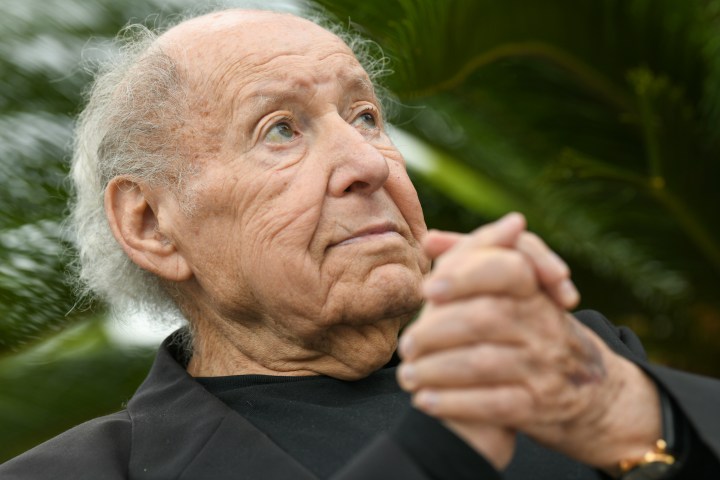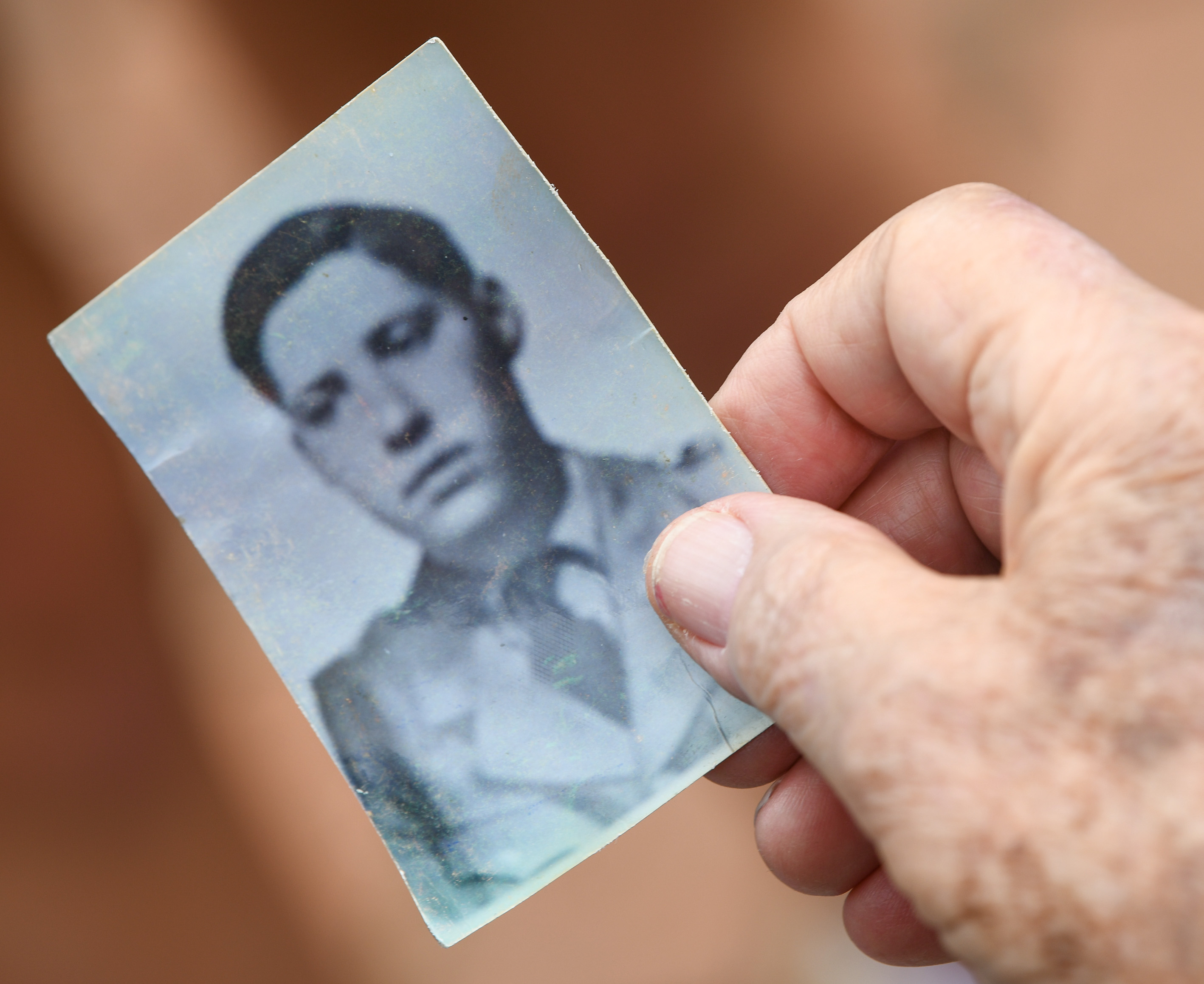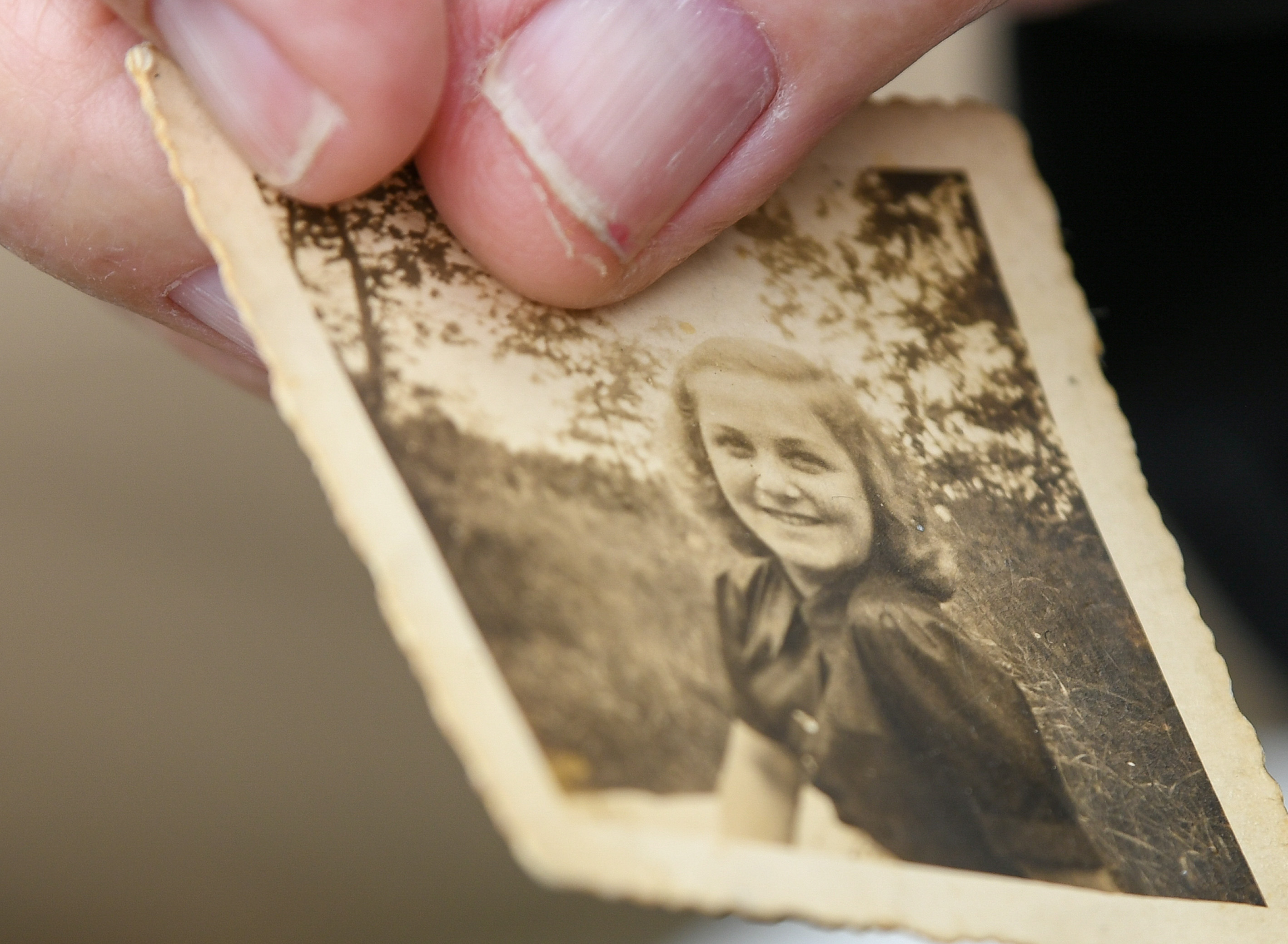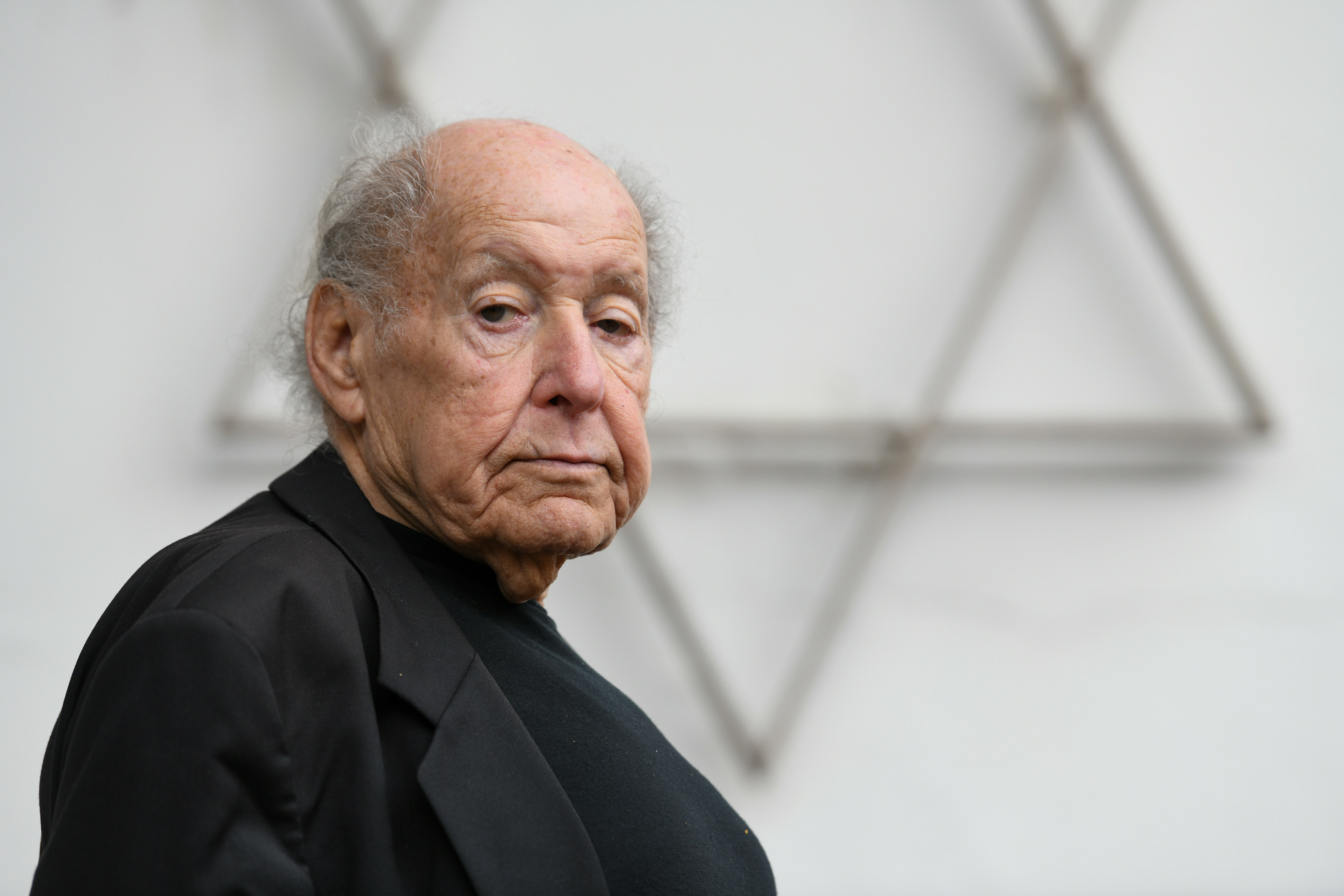Maverick Citizen
The Jew who was saved by the Nazis

Salomon Perel has the placid demeanour of a sage. One could imagine him in the brown habit of a Franciscan monk, or in the saffron robes of a Theravada Buddhist. What you cannot imagine is his small frame in the Nazi uniform he once wore.

Sally displays an old photograph taken of himself while being a member of the Hitler youth. Photo by Chris Collingridge
The 94-year-old Salomon Perel, who survived the mass extermination of Jews by donning a Nazi uniform, visited South Africa in mid-February 2020, just when the question of responsibility and apology once again surfaced through former president FW de Klerk’s public intransigence on the matter of apartheid being a crime against humanity.
Sally, as he is affectionately known, glides slowly through the grounds of King David School in Linksfield on a muggy midweek morning, his hands clasped behind his back. Children shyly wave at him, or stop him to talk. A tremor of excitement opens before Perel’s small entourage leading him to a bench by a cycad where he will wait for his Uber.
The children approach him cautiously—the giggling girls and the bruisers whose white school shirts seem ready to rip at the biceps. Around his tiny frame, a crowd gathers, and he welcomes it, smiling and nodding.
The questions the children ask are sweet and curious, and he answers them in his careful English, or in Hebrew, which the Hebrew teacher translates. One of the questions prompts him to take his wallet from his inside jacket pocket and extract two photographs: one of a young woman with golden hair whose name is Leni, the other of a boy in the uniform of a Nazi schoolboy whose name, at that point in history, was Joseph.
Perel was born in Germany in 1925, a Jew on a continent gripped with anti-Semitism that would find its peak expression in the mass genocide of Jews by the Nazi party under the leadership of Adolf Hitler.
When Salomon was 14, his family, who had already fled Germany for Poland, was about to be transported to the ghetto in Lodz, and his mother and father felt that he and his older brother needed to flee east, towards Russia, away from the German invasion.
His father’s parting message was “remain true to yourself always”. His mother’s parting message was “stay alive”.
In order to fulfil his mother’s command, he had to suppress his father’s. When faced with German officers commanding Jews in a group that had been rounded up in Grodno, Poland to step forward, Sally – who had ended up alone in an orphanage in which he’d been exposed to and had embraced a Komsomol education – shakily buried his papers in the sand using the heel of his shoe. When asked whether he was Jewish, he declared, in perfect German, that he was an ethnic German, a Volksdeutsche. For reasons he has never understood, the soldiers believed him without requiring him, like other men in the group who denied their Jewishness, to drop his pants so that they could see whether he was circumcised.
When asked what his name was, he said the first German name that came into his head: “Josef”.
When the soldiers discovered that he was fluent in Polish and Russian, he was welcomed into their unit, given a uniform and employed as a translator. He marched with these Germans all the way to the outskirts of Moscow. His nickname among his fellows was Jupp and he was well-loved, also by the unit’s leader, who announced one day that he was going to adopt Jupp, whose German parents, they all believed, had been killed by the Bolsheviks. Jupp was sent to Germany to attend an elite school for the Hitler Youth.
His relief at being alive and his fear of discovery was an internal war between Nazi and Jew inside – a kind of “intrapersonal Stockholm syndrome”. In all those years, Sally managed to hide his circumcision in spite of operating in a unit at the Eastern front and in spite of being in a boarding school with Jew-hating boys, and in spite of falling in love with Leni, a German girl who, like all the other young people, was steeped in the national socialism of the day and openly despised Jews.
When the war was over, Sally was reunited with his brother, who’d been freed from the concentration camp at Dachau. Together, they made their way to Palestine. His mother, father and sister did not survive the war.
For 40 years, no one except this brother knew that Sally had survived the war “in the skin of the enemy”, he told Maverick Citizen. “My brother told me when we were reunited that he did not care how I’d survived the war, only that I had survived it. But he warned me never to tell anyone, because no one would believe me.”
So for 40 years, Perel threw himself into his new life. He and his brother owned a zip factory in Tel Aviv. He married. He brought up two sons. Then, in 1985, he had a heart attack – and an epiphany.
“I was still in hospital and I said to my wife: I have something I need to tell the world.” Not even she knew that her husband had once been in the Hitler Youth. For six months, Perel wrote. The story flowed out of him easily. The relief was enormous. To have it out. To bring together the two parts of himself: the triumphant survivor and the self-loathing Jew. Jupp and Sally. The sheep in wolf’s clothing.
“That Hitler Youth, he was me. He is still in me. And I love him, because he saved me – me! Sally Perel! – with his Swastika. My life was saved by the Nazis. This is the absurdity. The Nazis saved my life. My survival of the war is not just traumatic. It is highly problematic.”
Perel’s book Europa Europa was published in 1989. A movie by the same name, directed by Agnieszka Holland, was released in 1991, grossing $5.5-million in the United States. It won the Golden Globe Award for Best Foreign Language Film and was nominated for the Academy Award for Best Adapted Screenplay. It was expected to be nominated for a Best Foreign Language Film at the Oscars, but Germany did not submit it. Perel tells me that this non-submission was the result of hefty internal debate with the film jury. The movie, some on the jury said, would stir up feelings of guilt and shame in Germans. And anyway, said others, who’s to say Perel’s story is true?
“So Der Spiegel and Stern did investigations, and traced some of my old friends from the school,” Perel says. His story was verified by a number of people he’d known at the school for Hitler Youth.
Since 1985, Perel has met not only one of his teachers from the school – who was genuinely glad to see his old student and who cried when Perel told him he was Jewish – but old friends and even his great first love, Leni, a fervent supporter of Hitler’s war against the Jews.

Sally displays an old photograph of his German girlfriend Leni who was unaware of his Jewish identity. Photo by Chris Collingridge
How does this work, I ask him, in the relationships between people who are, or were intimately bonded to one another, but were turned into enemies through complicated social and political circumstances? How does contrition and forgiveness work?
And how did all his friends react when they found out he was Jewish? Did anyone ever say sorry?
“That’s a question,” he exclaims. “No. No one ever apologised to me.”
He said they were willing to admit that Hitler had done “bad things with the Jews”, but that was the furthest they would go. Sally sees his Nazi friends from back then as co-victims of an appalling system of oppression and manipulation, of a culture war, and of persistent, sophisticated brainwashing.
He too was brainwashed, he says, sitting through the endless classes in which “science” was proffered to justify the rejection of non-Aryans and which led to mass genocide of which the boys, at that point, were unaware. So when Perel sees his friends – many of them dead now – they share the good memories, he says, and although he doesn’t avoid the topic of the evil of Hitler’s Germany, he sees no point in pushing them on the matter.
“We had good times. We had girlfriends. We had outings. Summer sport. Winter sport. We share these memories. The Nazis gave their youth the best they could and I benefitted. There were 800 of us in that school. We had light aircraft, motorcycles, we went marching through the city singing, we were given entertainment. We ate well. Free clothing. Of course, it was wonderful!”

Solomon Perel aka Sally or Shlomo Perel, 94 is an Israeli author and motivational speaker. He escaped the Nazi death camps by joining the Hitler youth while hiding his Jewish identity. Photo by Chris Collingridge
On the surface, it was wonderful. But it was a precarious and frightening existence during the war years, and for decades after the war, there was the lonely battle to carry on with normal life as though he was just another normal survivor.
Nightmares? “Oh yes,” he says. “To this day. Writing the book didn’t make them go away.”
Since he wrote his book, Perel has travelled all over Europe and Israel telling his story. He has been to the United States and by the time he turns 95 in April 2020, ironically one day after Hitler’s birthday, he will have travelled to Japan, South Africa and to Germany again in this year alone. Yet, he seems both undaunted by his schedule, and unfazed by answering the same questions over and over again by awe-struck audiences.
He was brought to South Africa by Indra Wussow of the Sylt Foundation, who, as a German, has had a lifetime interest in the relationship between perpetrators and victims of oppression, in transformation, reconciliation, identity and how the arts can help facilitate conversations around shame, guilt, contrition and restitution. The foundation’s latest project is called “Diverse People Remember”, which uses storytelling as an approach to trauma and reconciliation, and she invited Perel here as part of this project.
Together with Tali Nates of the Johannesburg Holocaust and Genocide Centre, and the Goethe Institute, she brought him over for a week of meetings with other Holocaust survivors, with school children and with storytelling groups.
Why is it important for him to tell this story? To keep answering the same questions over and over again from his various audiences?
“I see it as my duty. Because I survived in that particular way, I needed it to mean something. To make something good out of a terrible thing. And my story, strangely, contains so many elements that remain topics to this day: ideology, Weltanschauung, indoctrination, homosexuality (othering), the right to life, war, reconciliation – it’s all in there.
“But the thing is, Hitler knew how to make people stop thinking. Uniforms, accepted ways of behaving… all of it finally to strip people of their individuality. To make an unthinking mass out of the Hitlerjugend (Hitler Youth). He did it to me! And I was a Jew!
“So the message I have, to children in particular, is: think, analyse, criticise. Don’t get swept up. Watch out for indoctrination and lies. Watch out for Fake News.”

Solomon Perel aka Sally or Shlomo Perel, 94 is an Israeli author and motivational speaker. He escaped the Nazi death camps by joining the Hitler youth while hiding his Jewish identity. He visited King David High School Linksfield and shared his life experiences. Photo by Chris Collingridge
The bell sounds and break is over at King David. Slowly, reluctantly, the children whose questions Perel has answered so willingly, whose cheeks he has touched, and whose selfies with him he has borne with grace and a smile, disappear.
The Uber is summoned and he is taken back to his guest house in Melville. He will have six hours to rest before the screening of the movie Europa Europa, and another round of questions and answers will begin.
Perel is an affable and charming man. The Jew who survived the Jewish genocide by being a Nazi is also, apparently, indefatigable. DM/MC




















 Become an Insider
Become an Insider